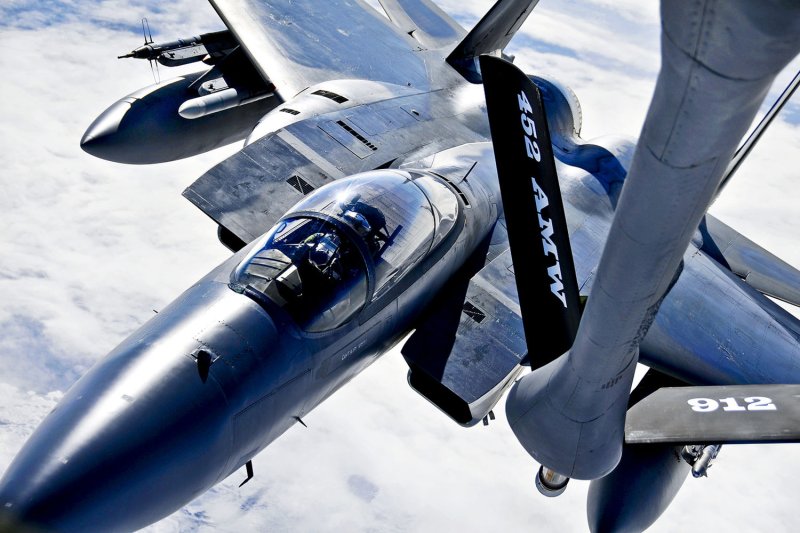An F-15 in use by the U.S. Air Force, similar to that reportedly used by Israel to buzz a Turkish drill ship. UPI/Miguel Lara III/USAF |
License Photo
NICOSIA, Cyprus, Sept. 30 (UPI) -- Israeli F-15 warplanes have reportedly buzzed a Turkish seismic ship exploring for natural gas off the eastern Mediterranean island of Cyprus amid a tense confrontation over the region's rich offshore natural gas reserves.
There was no immediate Israeli response to reports by Turkish and Cypriot newspapers on Thursday's alleged incident.
But the face-off between Israel and onetime strategic ally Turkey has been escalating steadily in recent days, particularly when Turkey sent in the drilling ship, escorted by a navy frigate and a flight of warplanes, Monday.
Ankara was also reported to have deployed F-16 fighters to the Turkish-occupied northern sector of Cyprus, supposedly to bolster its recent naval build-up in the eastern Mediterranean.
The reports said the Turks scrambled two of the F-16s when the Israeli F-15s allegedly violated Cypriot air space.
The F-15s were intercepted and withdrew. No gunfire was reported but the Turks claimed an Israeli air force helicopter later hovered over the drilling ship, the Piri Reis.
Omer Celik, deputy chairman of Turkey's ruling Justice and Development Party who oversees foreign affairs, declared, "We have shown clearly to everyone that we will not allow the eastern Mediterranean to become a Greek-Cyprus-Israel goal."
The Piri Reis was ordered to drill off southern Cyprus, the Greek sector of the island, after the Greek Cypriots began drilling in the so-called Aphrodite gas field.
That is an extension of large gas fields a U.S.-Israeli consortium discovered off the port city of Haifa in 2009-10.
These contain an estimated 25 trillion cubic feet of natural gas. Aphrodite and some of the 11 other exploration blocks off Cyprus, 150 miles northwest of Israel, are thought to contain similar amounts.
Israel and the Greek Cypriots signed a December 2010 agreement that set the boundaries of their exclusive economic zones in the Mediterranean.
Cyprus has been divided since 1974, when Turkey invaded after a short-lived coup by supporters of union with Greece. The Turks seized the northern third of the island and proclaimed it the Turkish Republic of Northern Cyprus.
Only Ankara recognizes the breakaway enclave. The Greek Cypriot Republic of Cyprus is recognized internationally.
Israel and the Greek Cypriots seek to collaborate on building undersea pipelines to transport their combined gas production to the European Union via Greece.
Turkey insists the Greek Cypriots cannot drill for gas unless the Turkish Cypriot minority can share in the proceeds.
Ankara also claims no drilling can take place until a peace agreement reuniting the island has been reached. All attempts to do that have failed.
However, the Greek Cypriot leader, President Demetris Christofias, and Turkish Cypriot leader Dervis Eroglu resumed the complex negotiations after a 10-day break for the U.N. General Assembly.
"If the Greek Cypriots agree to stop, we'll stop too," Turkish Minister for European Affairs Egemen Bagis declared during a visit Tuesday to the TRNC. "But if they insist on proceeding, they know Turkey's attitude very well."
The contentious gas issue, which already involves a dispute between Israel and its northern neighbor Lebanon, has been caught up in two of the region's most intractable conflicts, the 63-year-old Arab-Israeli confrontation and the historical rivalry between Turkey and Greece, with war-divided Cyprus as the flash point.
Turkey has effectively broken with its former ally, Israel, over its continued occupation and blockade of the Palestinian Gaza Strip. Relations nose-dived May 31, 2010, after the Israeli navy killed nine Turks during the interception in international waters of a Turkish ship carrying aid to Gaza.
The Turkish newspaper Today's Zaman, citing accounts of the reported buzzing of the Piri Reis in the Turkish daily Vatan and the Greek Cypriot newspaper Phileleftheros, said the Israeli F-15s took off from a base near Tel Aviv.
The pilots flew through the airspace of both Greek Cyprus and the TRNC, allegedly ignoring repeated warnings from Turkish Cypriot air traffic controllers.
The incident was the first reported confrontation between Israeli and Turkish aircraft since the crisis between the two countries erupted in 2010.
But, warned Israeli analyst Jonathan Spyer, given the potential energy riches at stake, "the storm clouds are gathering over the eastern Mediterranean.
"Muscle-flexing in the eastern Mediterranean forms part of Ankara's broader combined strategic and economic ambitions. Israel is part of the picture and is drawing closer to the Cypriots."















